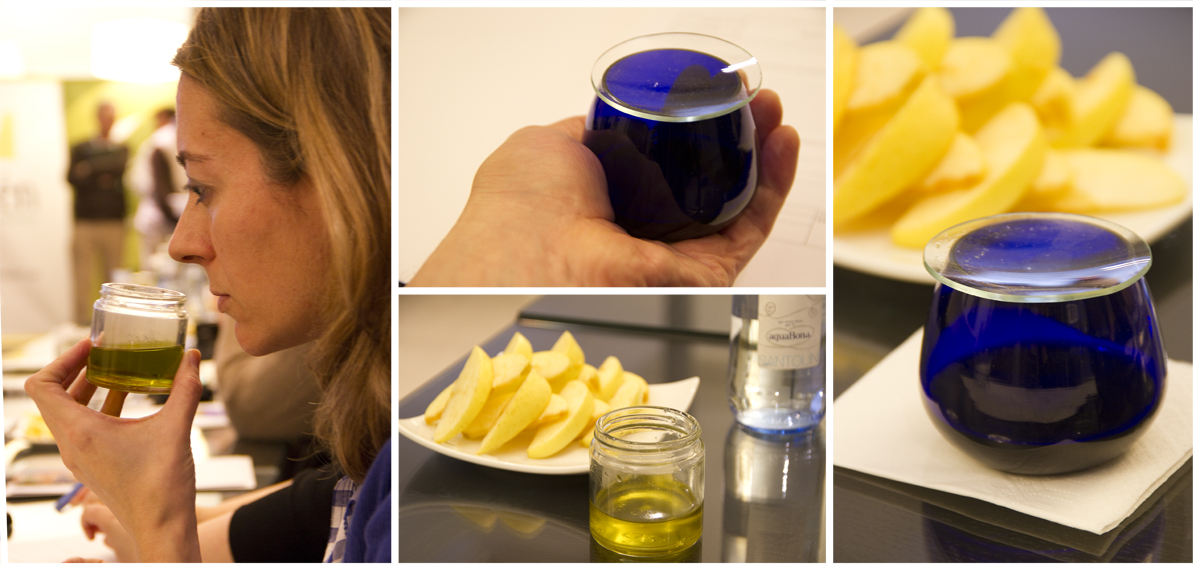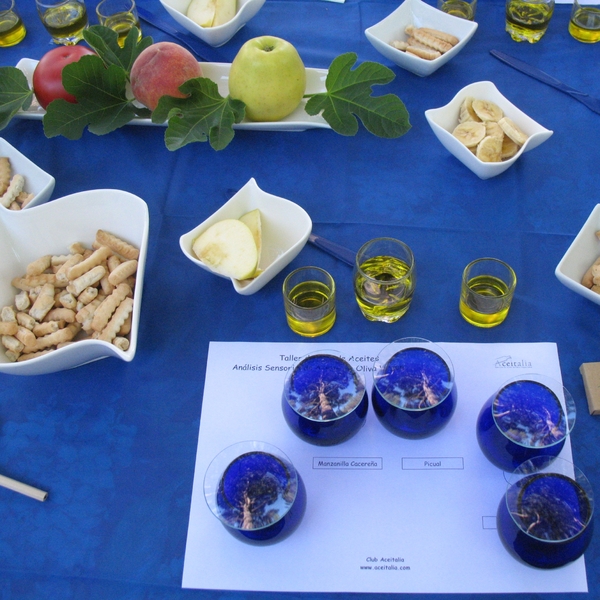It's only recently that Olive Oil has come to be considered a gourmet product. The varieties of this essential element of Mediterranean cuisine are constantly increasing. The type of olive, the climate of the place where the olives are cultivated, the time of harvest, the extraction method; these are only some of the factors that influence the flavour and quality of the oil, but how do we identify the qualities of each variety?
STEP 1. Essential elements
For this type of tasting we need: an olive oil tasting glass, which consists of a small round glass with a somewhat closed opening and blue so we don't see its interior (the color of the oil doesn't influence its properties but can influence your perception of quality. If you can't find one a small cognac glass will do); a glass lid, a napkin or beer mat to cover the glass; an apple; water; and some bread to neutralise the flavour between tastings. The objective of the tasting is to pick out as many organoleptic qualities of the product as possible; that is to say, the characteristics of its flavour, texture and smell. This is why it's recommended that the tastings be in the early morning when our senses are more acute. It's also important that the ambient temperature at the tasting be around 28 °C (82 °F) which guarantees the best environment for both the oils and our senses.

STEP 2. The power of scent
The scent is one of the determining factors with oil as its intensity and complexity are synonymous with quality. To appreciate the aroma in its entirety we should follow some simple steps. After pouring the sample in the glass, we should cover it with a napkin or glass lid. Next, we should lightly rub the bottom of the glass to heat the oil and intensify the scent of the sample (for just a few seconds). When uncovering it, we should take in the aroma with slow, deep breaths. Our sense of smell begins to pick out all the nuances: fruit, almond, walnut, spice, tomato, banana, or even freshly cut grass can come to mind. The more intense and varied the aroma is, the more indicative it is of the oil's quality.
STEP 3. The complexity of the flavour
For an oil to be considered virgin, it must be natural olive juice, and for it to be extra virgin, it has to be judged by a panel of experts. There are hundreds of distinct varieties that meet this requirement. To sense how fruity each variety is - the characteristic aroma and flavour - we should breathe in its scent and, around thirty seconds later, take a small sip of the sample. The oil must be distributed through the whole mouth to sense not only its flavour but its texture as well. It's important that it hits the tongue and the throat to stimulate our senses as much as possible. Sweet, sour, spicy... across our palate in distinct proportions. A trick to intensify the senses is to breathe a little air between our teeth while tasting each oil. Before trying a new sample, we should eat a piece of apple and drink water or eat some bread to eliminate all traces of flavour.

STEP 4. What have we sensed?
When analysing our perceptions of the oil we should not only note the complex flavours and aromas but also the imperfections it may have, if it is excessively bitter, too flat or even if it has fermented during the harvesting process, before entering the oil press, this would give it a characteristic smell of 'damp'.
It's important to keep in mind, for tastings as well as home consumption, that contrary to wine, oil is best consumed as soon as possible after production. Once it gives off a rancid smell, it's best to throw it out since it has not only lost its properties but can be bad for the health. On the other hand, oils that seem murky or that are dense in the cold should not necessarily be thrown out.
Lastly, if you are not familiar with good olive oils you will undoubtedly need some oils to benchmark aromas and flavours. I can suggest two which are perfect for either end of the scale due to their olive varieties :
1. Venta del Baron - for a strong green fruit flavour with balanced strong bitterness
https://www.mueloliva.es/venta-del-baron/
2. Abbae de Queiles - for a balanced mature fruity oil with virtually no bitterness.
http://www.haciendaqueiles.com/
If you can get hold of these it will get you well on your way to recognising good and bad oils. If you can't find them and need some more suggestions, just post a comment!
Good Luck!